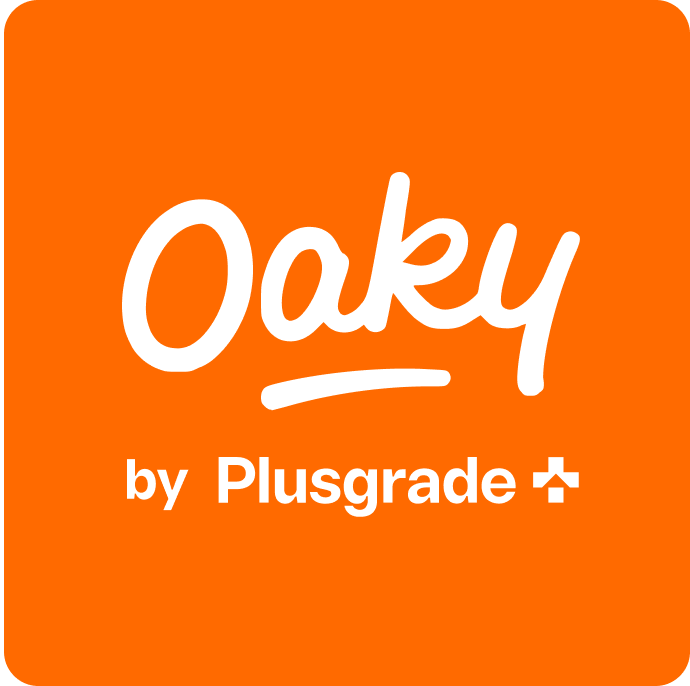How to build a winning hotel upsell program: 9 Key steps
Oaky
•

How many times have you tried to implement a hotel upsell program only to discover it doesn’t stick with your team? Perhaps your team didn’t feel confident enough to upsell guests or the process was too time-consuming and hard to manage? Implementing an upselling program in the hotel industry can be challenging, especially for hotel chains with a bigger range of upsell options and larger teams.
Whether your front desk team only needs to focus on a single hotel’s amenities or there are multiple properties, each with its own set of extra services, you’ll need an upsell program to drive incremental revenue. Here’s how to create or improve your hotel’s upselling program, with expert insights from Pablo Torres, Hospitality Consultant and Upselling Coach.
What is a hotel upsell program?
A hotel upsell program is a strategic approach used by hotels to increase revenue and enhance the guest experience by offering hotel guests personalized upgrades, add-ons, and/or premium services during the entire guest journey as part of a comprehensive upselling strategy.
Why is a hotel upsell program important for upselling success: 4 key benefits
While your team can also upsell without a program, creating one will help you boost revenue and enhance guest satisfaction through scalability and consistency, making it especially useful for hotel groups and chains. If your program is successful at one property, replicating this success at another property also becomes much easier as you don’t have to create a brand-new program from scratch.
Here are the key benefits you’re missing out on if you don’t have a defined upselling program in place:
1. Uniformity
Without a program: Upselling relies on individual front desk team members to promote offers which can lead to inconsistency in how and when upsells are presented.
With a program: A program will help you standardize offers across all touchpoints—emails, check-in, or mobile apps—ensuring every guest gets the same experience. Plus, you can be sure you’re using the best upselling practices across the board.
2. Increased revenue opportunities (thanks to proactivity)
Without a program: Upsells are often reactive and depend on whether a guest inquires about options.
With a program: Upsells become proactive, showcasing offers before, during the stay, or at check-in.
3. Scalability across properties
Without a program: Upselling efforts depend heavily on the skills of specific staff at each location.
With a program: Centralized tools ensure the same upsell strategies can be applied across an entire hotel chain or group.
4. Data-driven optimization
Without a program: It’s difficult to track performance or identify which offers are the most effective or who your top upsellers are.
With a program: Hotel upsell software like Oaky tracks conversion rates, revenue per upsell, and team performance, helping hotels continuously refine and improve their strategy.
Establishing a robust hotel upsell program (9 Key steps)
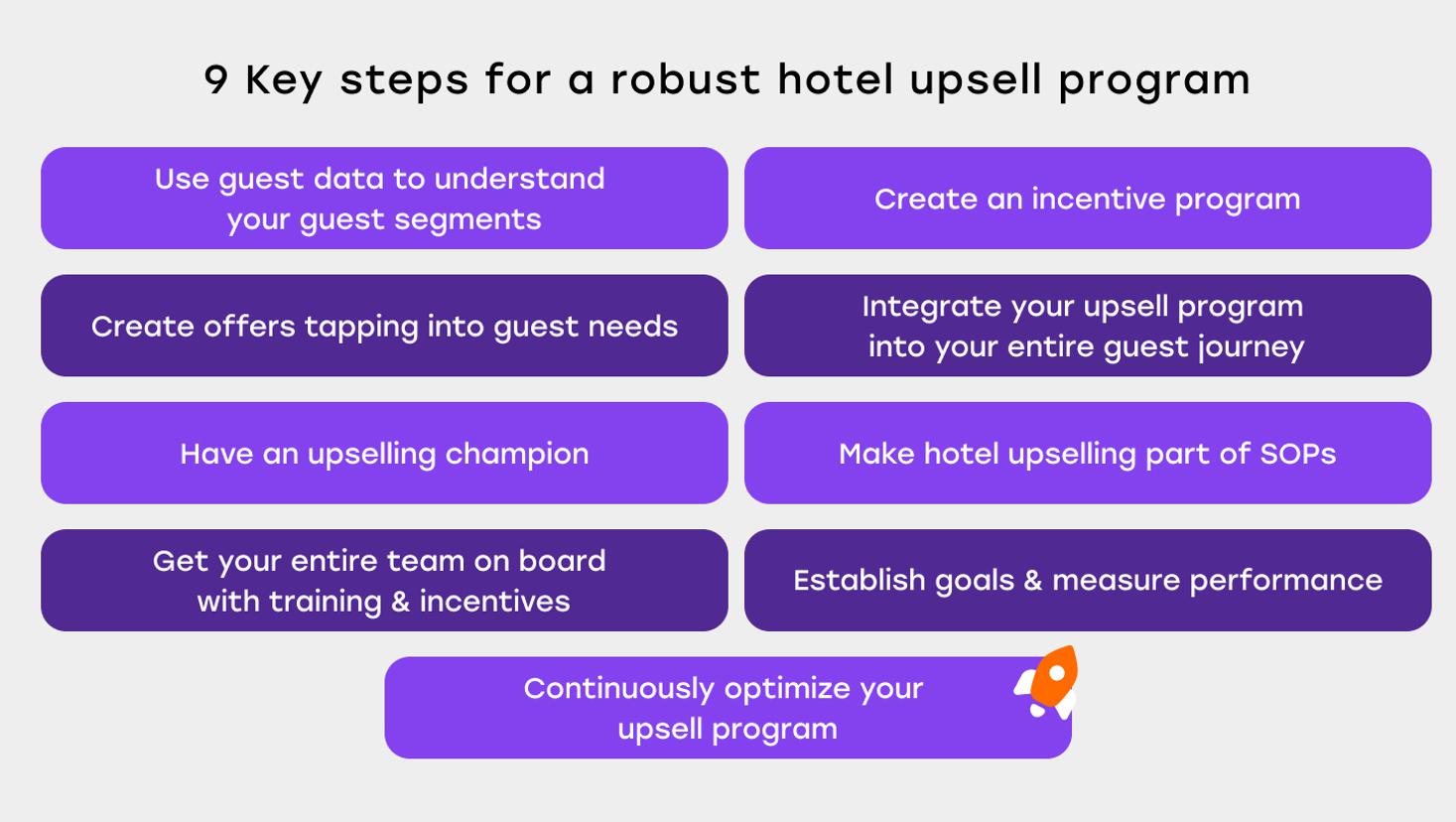
1. Use rich guest data to understand your guest segments
Before you start crafting your upselling offers and packages, first identify the various guest segments your hotel targets. This is important because each guest type has different needs, preferences, and expectations. Without understanding your guests, it will be challenging to offer more personalized service and encourage guests to book upgrades and experiences.
For instance, business travelers typically prioritize convenience and premium services such as an airport pick-up or early check-in. On the other hand, families are generally more interested in package deals with discounted tickets for family activities or connected rooms.
By segmenting guests and understanding their preferences, you can craft offers that align with their desires. This way, you’ll ensure that guests will be more likely to purchase ancillary products and services directly from your hotel rather than looking elsewhere.
2. Create offers to tap into guest needs and preferences
Data-driven personalization has become foundational to successful and profitable upselling. According to McKinsey, 71% of consumers expect personalized experiences, and 76% become frustrated when they don’t find them.
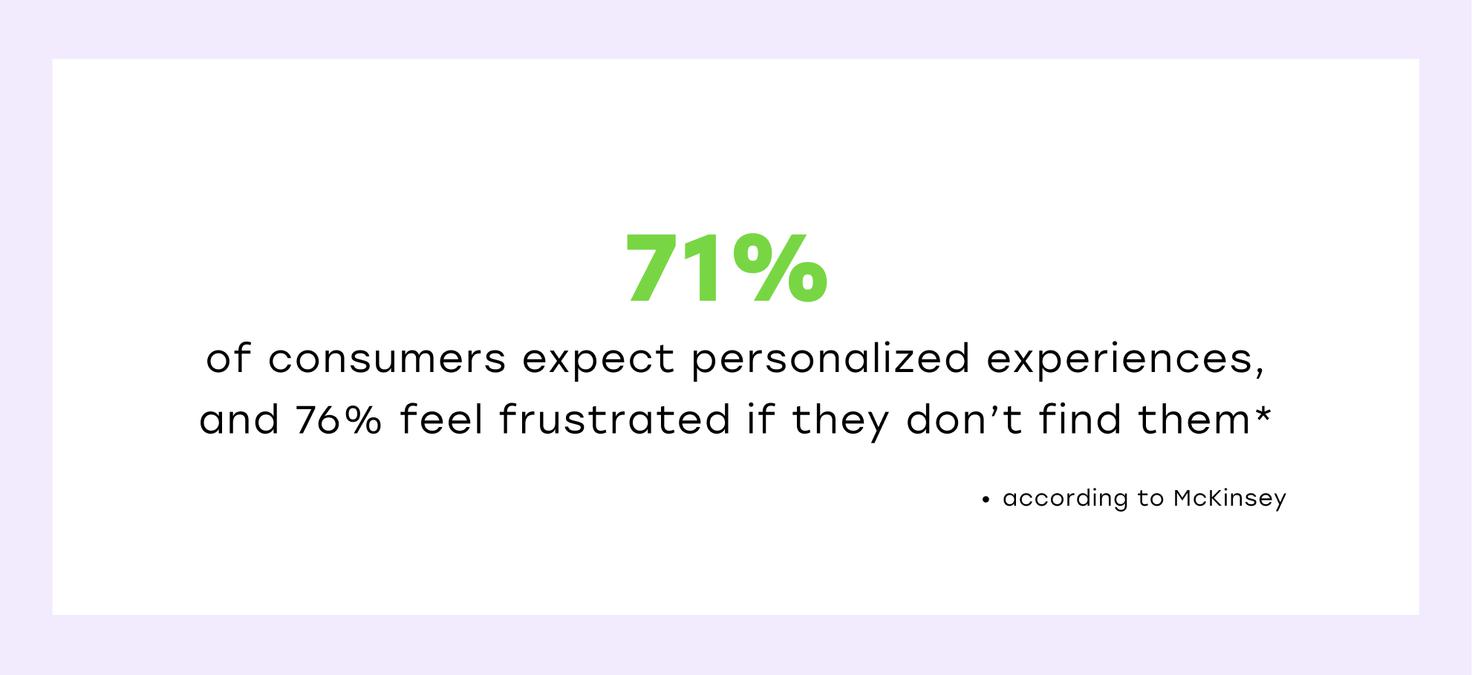
This highlights that offering tailored deals to specific guest segments is the right move. Leveraging guest data allows you to anticipate what they need and deliver relevant, customized packages, thereby enhancing guest experiences.
It’s not only about boosting your sales. Offering personalized services and deals will help your guests feel genuinely cared for, increasing the likelihood of positive reviews and repeat business.
3. Have an upselling champion
According to Pablo Torres, each upselling program needs an upselling champion to lead the efforts and inspire and motivate the rest of the team. The scope of their responsibilities includes:
Setting daily targets and tracking progress
Motivating the team to achieve their goals
Providing feedback on system reports and adjustments that need to be made.
It doesn’t have to be a manager, though. While a hotel front desk manager is often assigned to oversee the upselling program, any senior team member can fill the role of an upselling champion.
This could be a senior receptionist or any passionate team member who’s eager to boost sales with upselling. The key is to find the most engaged and motivated person willing to drive the initiative forward.
4. Get your entire team on board with upselling through training and incentives
Effective upselling isn’t a solo effort. You need your entire team to buy into the upselling program to maximize the results and make your strategy stick.
Know that you might encounter team resistance on your path to establishing the program. This is normal.
To gain a buy-in from the entire team, your goal is to position upselling as “a win-win-win”—where increased hotel revenue leads to more rewards for the team and elevates the guest experience. This approach not only improves performance but also helps your team feel more fulfilled in their roles.
Establishing an incentive program to reward top performers and providing upselling training can significantly boost team engagement and enthusiasm. As Pablo highlights, training should focus on improving the 80% of the team who may not be the best upsellers yet. With proper training, this group can exponentially increase the hotel’s revenue.
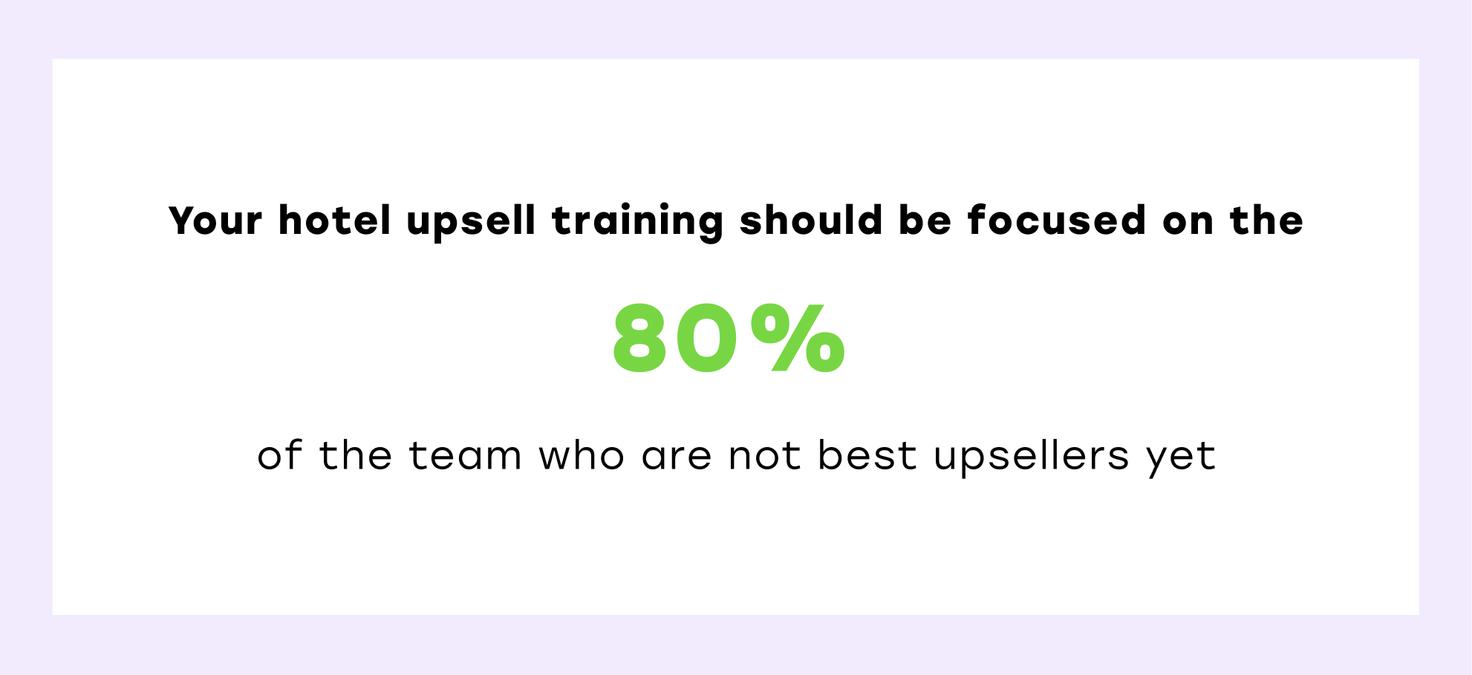
All in all, building confidence and celebrating achievements by providing fair rewards, especially when breaking upselling records, are the secret ingredients behind Oaky’s top revenue performers.
5. Create an incentive program to reward your front desk agents
When it comes to front desk upselling, rewarding your front desk team is a must for keeping motivation high. Without an incentive program, you’re unlikely to maintain motivation and generate revenue consistently. This is where performance-based incentives come into the picture.
These incentives will encourage your front desk agents to engage with guests more and ensure consistent sales, boosting your team’s satisfaction and morale.
According to Pablo Torres, you should ideally roll out the following incentive structure:
10% commission for room sales
5% for cross-selling (services) sales (e.g., breakfast, spa packages)
Additional incentives for the champion (the person leading the program).
This ensures the hotel staff is motivated to participate in upselling actively. Use hotel upselling software like Oaky to put this program into practice. By using hotel upsell software, you can properly track your team’s performance and equip them with guest data and insights to upsell the most relevant upgrades and deals during check-in.
6. Integrate your upselling program into the entire guest journey
One common mistake hotels make is limiting upselling to just one stage of the guest journey. Most often, upselling is only done at check-in, overlooking pre-arrival and in-stay stages.
While front desk upselling, especially when done with the help of hotel upselling tools, can boost TRevPAR by 2-5%, incorporating it into pre-arrival and in-stay stages can unlock even greater revenue opportunities and increase guest satisfaction.
Pre-arrival upselling
Pre-arrival upselling is essential for enabling guests to personalize their stay before they even arrive. As Juan Serna, Global Online Sales, Head of Digital Ancillary at Iberostar Beachfront Resorts, highlights, with an average guest journey spanning 90 days, guests often start thinking about their stay around day 20. Iberostar uses this window to engage guests via Oaky, helping them explore upgrades and offerings to make their stay more memorable. With bookings already complete and paid for, guests are more open to purchasing add-ons and hotel room upgrades, creating additional revenue streams for hotels.
Front desk upselling
Front desk upselling remains a powerful tool for boosting upsell revenue. Thanks to personal interactions, front desk agents can effectively promote high-margin deals (e.g. upselling hotel rooms, exclusive experiences, special occasion packages).
Pre-arrival upselling can also improve your front desk upselling efforts. Many hotels sell breakfast and parking at check-in, but offering these deals during the pre-arrival stage gives guests the convenience of booking essentials in advance for peace of mind. For hotels, this approach allows front desk agents to focus on upselling a higher room category and exclusive experiences, maximizing revenue potential.
Chrystal Timmerman, Director of Revenue Management at Sofitel Legend The Grand Amsterdam, elaborates on this idea:
In-stay upselling
In-stay upselling ensures existing guests have ongoing access to deals and services during their stay.
It’s perfect for capturing last-minute bookings and filling gaps for spa treatments, gym sessions, or other facilities that weren’t booked earlier in the journey.
7. Make hotel upselling part of your Standard Operating Procedures (SOPs) and daily briefings
To ensure the long-term success of your upselling program, it needs to become a natural part of your hotel’s operations. Embedding upselling into your Standard Operating Procedures (SOPs) and daily briefings helps emphasize its importance and keeps it top of mind for your team.
- Incorporate upselling into SOPs
Incorporating upselling into Standard Operating Procedures (SOPs) is crucial for the long-term success of your hotel upsell program.
Create a clear framework for your team to follow. Outline key steps and information, such as:
When and how to offer upgrades or add-ons (pre-arrival, front desk, in-stay)
Guidelines for communicating offers effectively and confidently
Upselling techniques to use
How to log and track upselling performance.
Having these procedures documented ensures consistency, provides a reference point for training, and simplifies the onboarding of new team members.
- Highlight upselling in daily briefings
Daily briefings are a great opportunity to keep upselling front and center.
By making upselling a regular topic of discussion in daily briefings, you can ensure that your team is motivated and equipped to deliver a high-quality upselling experience to every guest.
Use this time to:
Set daily goals and encourage the team to aim for specific targets
Celebrate successes by sharing wins and highlighting top performers to boost motivation
Address challenges by discussing any obstacles the team is facing and offering solutions
Share tips and techniques to improve skills and confidence.
You can ask your upselling champion to track progress, review reports, and provide feedback during briefings. This keeps the team motivated and ensures everyone is aligned with the program’s goals.
8. Establish goals and measure performance
Whether your hotel is already sailing smoothly with upselling or just dipping its toes in the water, anchoring your strategy in realistic data is how you stay on course and see measurable results.
1. Assess past performance (if applicable)
If your hotel has engaged in upselling before, start by analyzing the following previous results:
Average upsell revenue per month
Conversion rates (percentage of arrivals that upsold)
Average upsell value per transaction.
Use this data to set incremental targets. For example, aim for a 20% increase over the current average to push performance without overwhelming your team.
2. Use calculators to forecast goals
Hotels new to upselling can use performance calculators to establish benchmarks.
Key variables include:
Conversion rate
Average supplement value (revenue per upsell)
Length of stay (the duration of guest stays which impacts total revenue potential).
Formula example:
Expected Upsell Revenue = (Arrivals Upsold %) × (Average Supplement) × (Length of Stay)
This calculation provides a realistic revenue projection, making it easier to set expectations.
3. Focus on high-impact metrics
Prioritize metrics that directly impact revenue. These include:
Conversion rate: Strive for 5–15% of arrivals upsold.
Average upsell value: Target higher-value sales over low-margin items like breakfast add-ons.
Revenue per available room (RevPAR) impact: Measure upselling’s contribution to RevPAR to assess its influence on the total hotel performance.
For urban hotels, aim for a 1–1.5% RevPAR increase, while resorts can target 2–2.5%, given longer stays and higher spending habits.
4. Personalize goals for team members
Avoid a one-size-fits-all approach. Instead:
Set goals based on individual performance histories
Challenge top performers to grow by 20–30%
Encourage lower performers with smaller, achievable targets to build confidence and momentum.
Examples:
A high-performing agent generating €1,000 in upsell revenue might aim for €1,200 next month.
A part-time employee generating €300 could be tasked with reaching €400.
5. Align goals with seasonality and occupancy
Recognize that upselling opportunities fluctuate based on occupancy and season. Adjust monthly forecasts based on these occupancy patterns so that your targets reflect real-time opportunities.
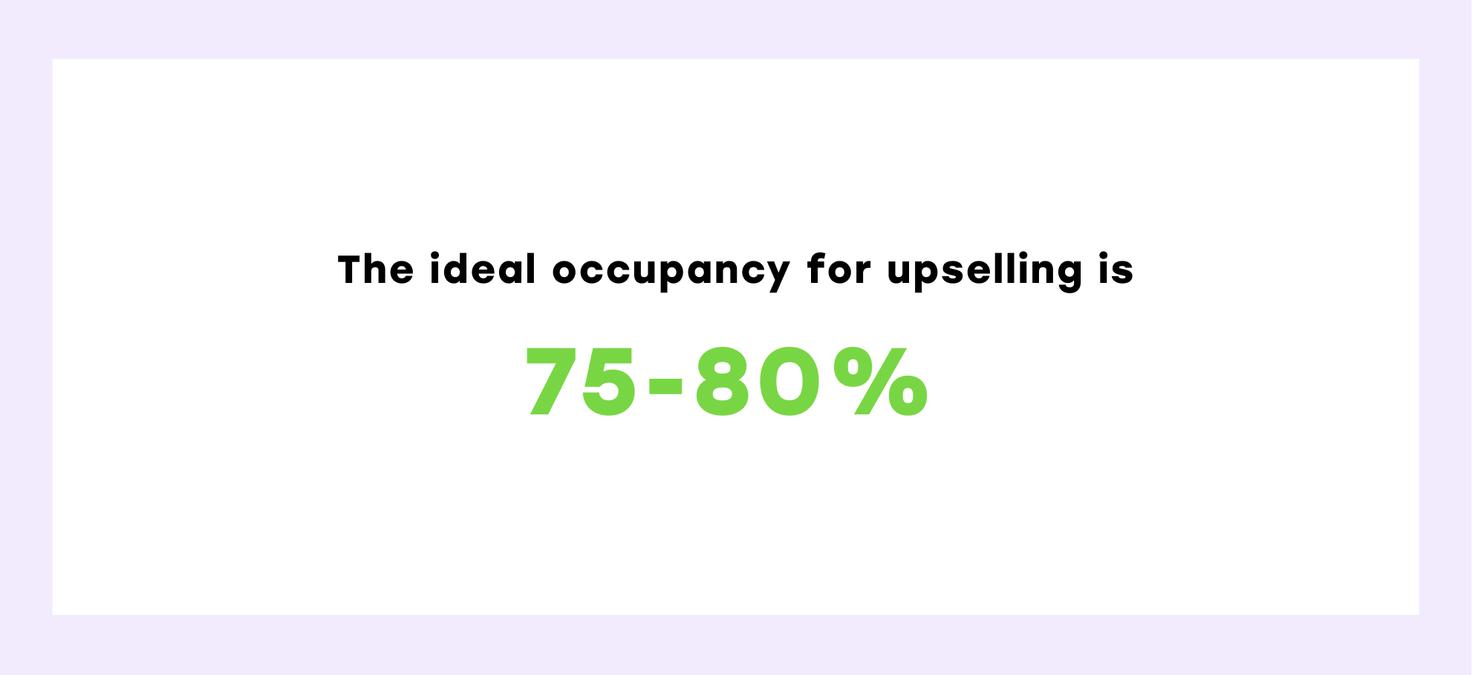
The ideal occupancy for upselling is 70–85%. This range provides enough availability to upsell without overwhelming the team.
9. Continuously optimize your hotel upsell program
Similarly to how upselling isn’t a one-size-fits-all approach, it’s also not a set-it-and-forget-it process. It requires constant improvement and performance monitoring to keep your hotel on the right track. Here's what you can do to keep optimizing your hotel upsell program while maintaining high team morale:
1. Monitor the results and conduct follow-up sessions
Follow up regularly with your team to check that targets are being met and that they’re staying motivated. Then, schedule quarterly reviews with senior management to show progress and results and introduce champion audits to ensure the program is being followed correctly and, if necessary, identify areas of improvement.
2. Provide ongoing support and feedback
Upselling is a skill that improves with practice. Offer continuous coaching and constructive feedback to help your team refine their techniques. Regular check-ins and refresher training sessions will keep them sharp and motivated.

3. Foster healthy competition
Organize short-term competitions with clear objectives, such as who can upsell the most hotel room upgrades or add-on services within a specific timeframe. Present these challenges in a fun and exciting way, rather than creating pressure.
Make the most effective upselling techniques part of your hotel upselling program
Effective upselling techniques are critical to maximizing revenue and enhancing the guest experience. Here are some effective upselling techniques to make part of your upselling program:
- Personalization and timing
Personalization and timing are key to effective upselling. By tailoring your upselling offers to the individual preferences and needs of each guest, you can increase the likelihood of a successful upsell. Timing is also critical, as upselling offers should be made at the right moment in the guest journey to maximize their impact.
Some examples of personalized upselling offers include:
- Room upgrades tailored to the guest’s preferences and budget
- Special packages and promotions based on the guest’s interests and needs
- Upselling offers made at the right moment in the guest's journey, such as during check-in or at the end of the guest’s stay
- Bundling Offers
Bundling offers is another effective upselling technique. By packaging multiple offers together, you can create a more compelling and attractive upselling offer that is more likely to be accepted by the guest.
Some examples of bundled upselling offers include:
- Room upgrades bundled with breakfast or other amenities
- Packages that include multiple services or experiences, such as a spa day or a guided tour
- Bundled offers that include a discount or promotion
- Leveraging scarcity and FOMO
Scarcity and the fear of missing out (FOMO) are powerful psychological triggers that can drive guests to take action quickly. When used effectively, these tactics can help hotels increase upsell conversions by creating a sense of urgency and exclusivity.
Here's how you can put them into practice:
- Highlight limited availability: Highlight exclusive room upgrades, experiences, or discounts with time-sensitive messaging.
Example: “Only 2 suites left at this price—book now!” - Use social proof: Showcase guest reviews or popular choices to create demand.
Example: “Guests love our spa package—upgrade now before it’s fully booked!” - Offer exclusive perks: Offer VIP-only deals or event-based upgrades.
Example: “Upgrade for early check-in and free drinks—limited to VIP guests!”
Invest in hotel upsell software to make upselling profitable and easy for your team
Building a successful hotel upsell program takes more than just good intentions. It’s a multi-step process that demands focus, consistency, and ongoing optimization.
Many hotels struggle to sustain their upselling efforts because managing it manually can be time-consuming and overwhelming, especially when trying to integrate it across the entire guest journey.
That’s why leading hotel chains like Radisson Hotels, Accor, and Iberostar have turned to Oaky. Our hotel upselling software makes upselling scalable and profitable. It gives teams the guest data they need to tailor offers to each guest segment and the automation features to reduce their workload.
Your guests will love it too! They’ll receive a more personalized, enjoyable guest experience where relevant upgrades, services, and add-ons are offered at every stage of the guest journey.
Check out our customer success stories to see how hotels are transforming their upselling strategies with Oaky.
